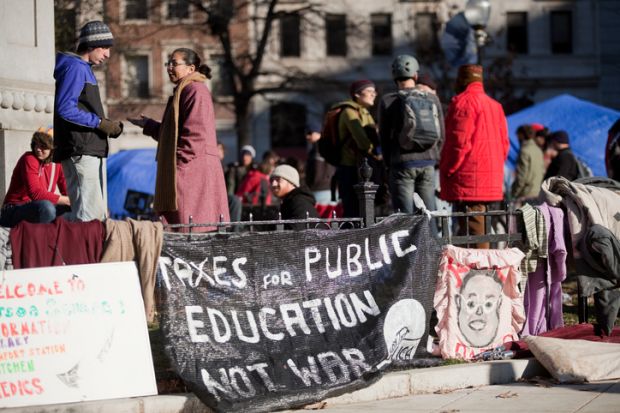Arguments made in defence of academic freedom are often “incomprehensible” to the wider public, the former president of the Central European University has said, as he called for a much broader defence of the right for universities to self-govern without interference.
Michael Ignatieff, who led the institution when it was "forced out" of Viktor Orbán’s Hungary in 2018, feared universities were vulnerable because they did not have a constituency prepared to defend them in wider public discourse and often struggled to make the case for themselves.
He said part of the reason his university – where he now teaches after stepping down as president in 2021 – had to relocate to Vienna in the face of laws that hampered its ability to operate in Budapest was because it was “unable to rally large support in the wider community to defend it”.
Speaking during a wide-ranging debate on academic freedom organised by UCL, Professor Ignatieff said he had “the scars of the battle for academic freedom on my back” after the episode.
“We learned a university could be a target of a determined authoritarian regime, and when it is the target it is difficult to resist,” he said.
Fellow panellist Adrienne Stone, from Melbourne Law School, said although much of the talk about academic freedom was connected to a “very noisy culture war”, there were more grave threats facing institutions which were at risk of “academic retrogression”.
She described a “slow creep” of non-academic values into universities including the private funding of research, the precarious nature of much academic employment and the application of human resources standards from the corporate world, with academics expected to sign up to “codes of conduct” that prevented them bringing their institutions into disrepute.
“If we allow this academic retrogression to go on, we may wake up to discover our universities have been fundamentally transformed, while we’ve been distracted worrying about controversial speakers on campus,” she said.
But Professor Ignatieff, who led Canada’s Liberal Party before turning to academia, said these debates were hard for the wider public to follow.
“I think one of the difficulties is a political one. The conversation we are having right now and all the comments – although germane, relevant and extremely well articulated – are essentially incomprehensible outside the university,” he said.
“If we want to defend the autonomy of the university in political debate, we have to make friends and allies and build a broad case that is sustainable.
“Ad-hoc medalling by government in research investments that keep universities going is a bad thing but hard-pressed taxpayers say: ‘It’s our money and we elect them; we didn’t elect you.’
“In Hungary it was very difficult to arise the broad-based constituency of support that you need to sustain the idea of academic freedom.”
Instead, Professor Ignatieff said, academics should make the case that their freedom is important in order to “create, protect and preserve the knowledge upon which democratic debate depends”, something that is “crucial for all citizens”.
The debate also considered questions about the lack of diversity within universities, with panellists questioned on whether this meant that those who exercise academic freedom don’t always suffer its consequences or have insight into the harms that are being done.
Michael Spence, UCL’s president, said recent appointments had started to change the institution’s reputation as an “old boys’ club” but conceded there was still some way to go.
Addressing concerns about a uniformity of thought within universities on issues such as Brexit, Dr Spence said he agreed that there was a need to avoid “groupthink” but that didn’t amount to “artificially plonking a Brexiteer in a European studies department”.
“But we do in our building of academic communities, I think, have an epistemic responsibility to make sure we are not simply involved in the process of narcissistic self-reproduction. Part of that is making sure that we have a diversity of personal histories in the people in the department and a diversity of methodologies and expertise,” he added.
Register to continue
Why register?
- Registration is free and only takes a moment
- Once registered, you can read 3 articles a month
- Sign up for our newsletter
Subscribe
Or subscribe for unlimited access to:
- Unlimited access to news, views, insights & reviews
- Digital editions
- Digital access to THE’s university and college rankings analysis
Already registered or a current subscriber? Login








